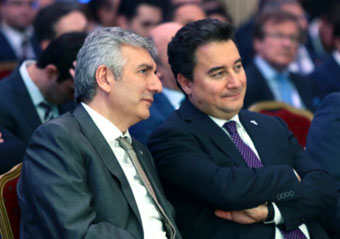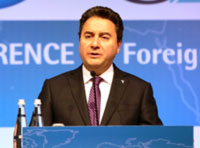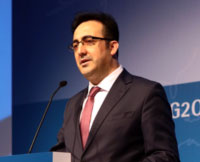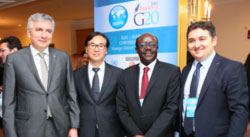News
Investment Agencies from Various Countries Convene at Conference on Foreign Direct Investment
- 27.04.2015
- News

The “G20 – WAIPA Conference on Foreign Direct Investment” held in Conrad Hotel in Istanbul was organized by the World Association of Investment Promotion Agencies (WAIPA), chaired by the Republic of Türkiye Prime Ministry Investment Support and Promotion Agency (ISPAT).
Also present at the conference hosted by İlker Aycı, President of ISPAT and WAIPA, were Erdal Bahçıvan, Chairman of the Board of Istanbul Chamber of Industry (ICI), member of the B20 Executive Committee and Deputy Primer Minister Ali Babacan, who gave a speech at the event. Following were remarks by Babacan: “If you are to spend one million or one billion dollars, make it so that it is spent by the private sector, not the public sector. I assure you that this will breed far better results for productivity, growth and sustainability.” Babacan also underscored the importance of property rights and commitments to protect these rights, rule of law, human capital, infrastructure and openness as well as the wrong consideration of international trade and investment as a zero sum game.
Ali Babacan referred to the severe crisis in the economy and noted that the worst is probably over. He also added that the future now seems clearer and that they wished to see better developments. Babacan stated that the recovery would be irregular and very fragile with ups and downs: “Anything can happen any day. Crises in the financial sector are deep and long-term. What we say to G20 countries is this: Stick to your structural reform commitments. We asked G20 countries to found a monitoring institution. We will be monitoring each country to see if they stick to their commitments.”

Deputy Prime Minister Ali Babacan
Babacan detailed public infrastructure projects and examples of Public-Private Partnership (PPP) in Türkiye, referring to efforts by G20 to channel higher investment and pension funds into infrastructure projects. Babacan stated that long-term financing yields reasonable and sound returns for countries; which he underlined that would be possible only in an environment of trust. He added that if such an environment both G20 and B20 strive to achieve is created, PPP projects will receive sustainable funds, noting that private sector involvement is conducive to much faster completion of projects with far less costs.
Babacan also referred to high levels of productivity in infrastructure projects with private sector involvement and added to his remarks: “Governments sometimes make investments just for the sake of investment. Political aims take precedence over rationality, which unfortunately results in bad outcomes in infrastructure projects that incur millions/ billions of billions costs.”
Erdal Bahçıvan: Foreign direct investments support development of companies
In his opening speech, Chairman of the Board of Istanbul Chamber of Industry (ICI) Erdal Bahçıvan referred to foreign direct investments as an important topic that should receive larger emphasis in the economic agenda. He stated that efforts to find necessary funds has gained ground in an age with increased global interdependence between countries, underscoring the critical importance of cooperation between companies and governments for foreign investments. Following were ICI Chairman’s remarks: “What is a prospective and rentable investment? What are economic facts that parties need to face? We will be tackling these questions but we also have to make tangible progress during this meeting.” He continued his speech as follows: “The relationship between global value chain and foreign investment is crucial. Today, 70% of global trade is made up of capital goods as well as intermediate goods and services. Increased production in developing countries will create new employment, which will have a positive economic effect in the value chain. This is why foreign direct investment is important. Foreign direct investment will contribute to the development of companies, help them specialize further in their fields and pave the way to boost employment. Take a look at China and India for instance. Foreign investments in goods and services production in these countries have stimulated research and innovation. The middle class in these countries has flourished in a healthy way.”

Başbakanlık Yatırım Ajansı ve
WAIPA Başkanı M. İlker Aycı
ICI Chairman also referred to risks in global interdependence, highlighting possible damage to the value chain by minimal duties and duty cuts. Bahçıvan noted that B20 worked on these issues, indicating their support for regulations and rules that are easier, less costly and which facilitate the activities of overseas institutions, in line with free and open trade principle. Bahçıvan also mentioned the role played by SMEs, underscoring the 50% rate of global income and 75% rate of employment generated by SMEs. He added that the “SMEs and Entrepreneurship” working group within B20 took decisions that support transition to a new financial system and high technology digital infrastructure.
Bahçıvan also mentioned recommendations by the B20 Infrastructure and Investment working group, adding that B20 was aware of the importance of infrastructure investment not only for growth goals but for SMEs and low-income countries as well. Bahçıvan’s remarks were as follows: “Unfortunately, there is a stark difference between countries in terms of infrastructure investment, which will grow even deeper in the coming years. Experts indicate a fifteen to twenty trillion dollar difference in global investment spending in fifteen years. We as B20 are aware of the gravity of this situation. The Infrastructure and Investment working group therefore supports many international investment initiatives and calls for governments to re-examine and prioritize their investment requirements. A few questions emerge in this area: What are the projects that serve economic growth and socioeconomic needs? The answer seems clear, but in fact most public investments are carried out with political motivations. Governments need to continue investing in infrastructure even under difficult economic conditions. Foreign direct capital investments should be hence supported on a national and global scale. The Infrastructure and Investment working group calls for a non-binding international investment agreement model to secure necessary support. This agreement will render foreign direct investment less expensive and more accessible.”
Bahçıvan also referred to the upcoming meeting agenda of B20, announcing the B20 working groups meeting in the OECD forum in Paris in early June, a meeting in July which during which B20 recommendations will be announced, a meeting in Ankara in September during which B20 recommendations will be shared with governments and a G20 Leaders Summit to be held in Antalya in November. Bahçıvan concluded his speech by stating that they would hand over presidency to China in 2016, following the end of their activities.

At his opening speech, President of WAIPA and Prime Ministry Investment Support and Promotion Agency (ISPAT) M. İlker Aycı mentioned WAIPA’s increased role in the global investment arena. He also referred to the need for increased cooperation within WAIPA, emphasizing the need for all parties to develop cooperation in an effort to understand better the demands of investors. Aycı’s remarks were as follows:
“The investment goal of G20 is compatible with the fundamental goal of WAIPA. This is why efforts need to converge. It is a task of achieving balance between considering the sensibilities of national governments in countries with Investment Support Agencies and making effort to improve regulations in trade. G20 believes in the significance to advance and develop WAIPA’s current efforts effectively.”
Pepsi Co Türkiye General Manager Neil Pryor also gave a speech at the event referring to their 66 billion dollar turnover of which 8.7 billion dollars were distributed to shareholders. Pryor also noted their growth at 9% in developing countries and rising markets, adding that they shared technologies and know-how with countries they invested in, as part of a relationship based on mutual benefits. Neil Pryor stated that parties shared their own agendas in the meeting and that it contributed to the global investment arena in terms of improving mutual understanding.
In his speech, Executive Manager of OECD Investment Division Karim Dahou identified the role of governments, responsible business investments and infrastructure investments as major elements in global foreign capital investments. Dahou referred to the need for governments to motivate the private sector to invest in infrastructure and create the necessary environment for such investments. Karim Dahou added in his remarks that OECD is ready to guide the investment process between countries.
Secretary General of Vienna Economic Forum Dr. Elena Kirtcheva described the activites of VEF, founded in 2004 and operates in countries across the Adriatic Sea and Black Sea. Kirtcheva’s speech included: “All parties need to work together for economic development. What will carry us further is primarily trust and mutual synergy.”
Managing Director of United Nations Industrial Development Organization Dr. Celestin Monga started his remarks by extending his gratitude to Türkiye which opened its doors to people in neighboring countries who have fled conflicts at home. Monga noted that he came from Cameroon, a country that frequently suffered from conflicts. Dr. Celestin Monga emphasized that foreign direct capital actually served a peaceful and stable world. Monga referred to industry’s key role in economic growth and the need to establish special industrial zones which is the only way to create employment for the youth.